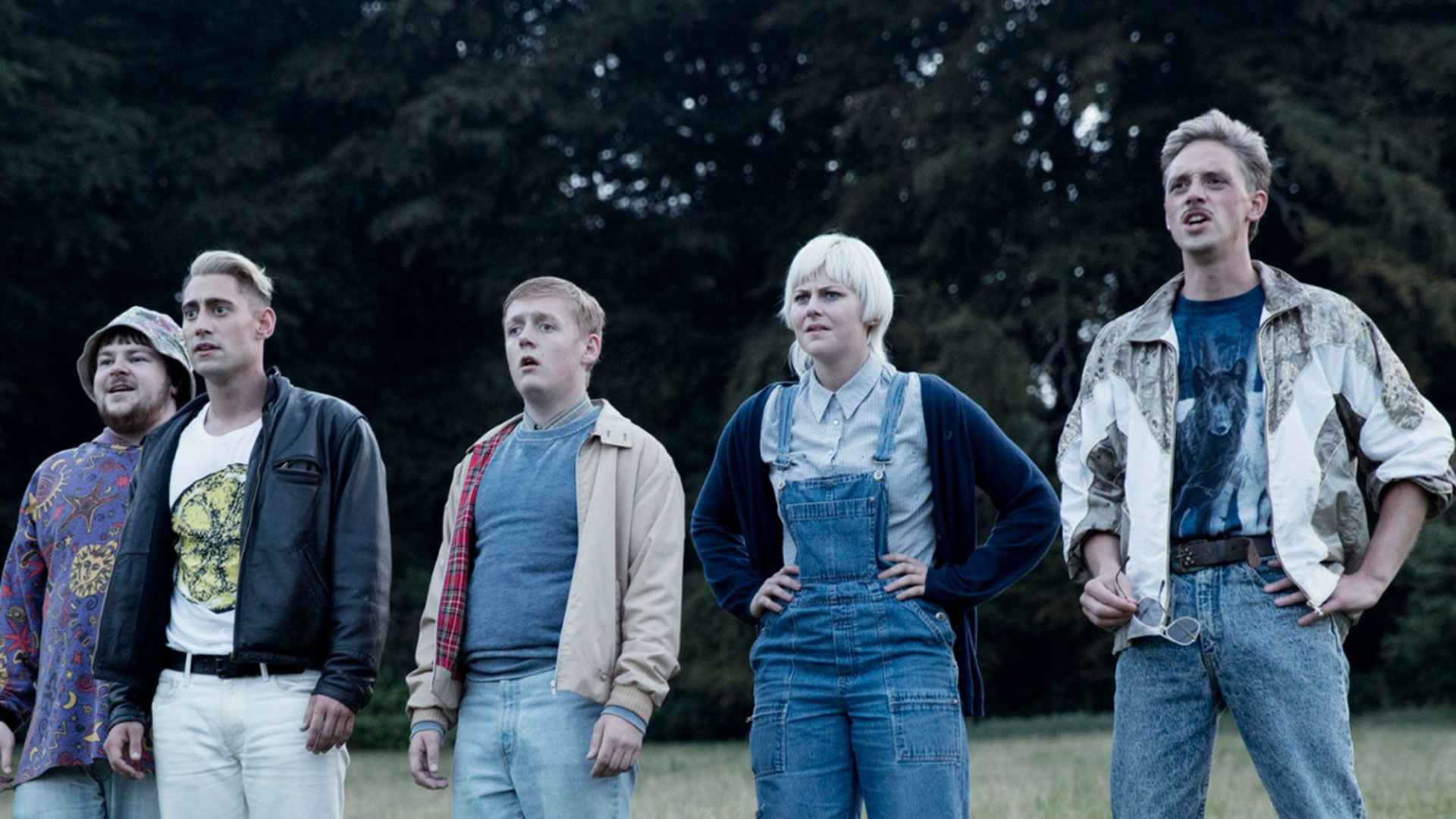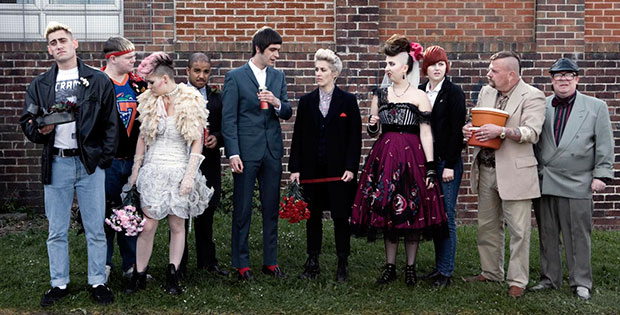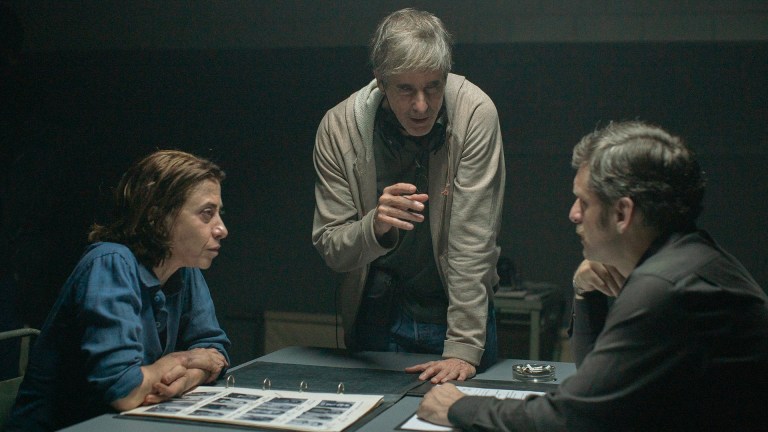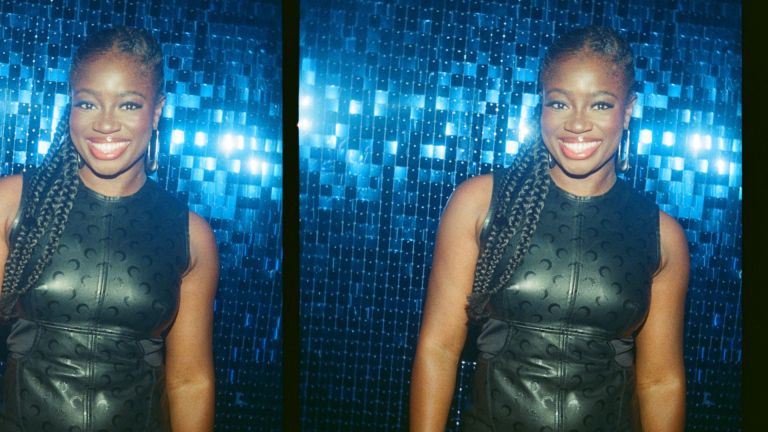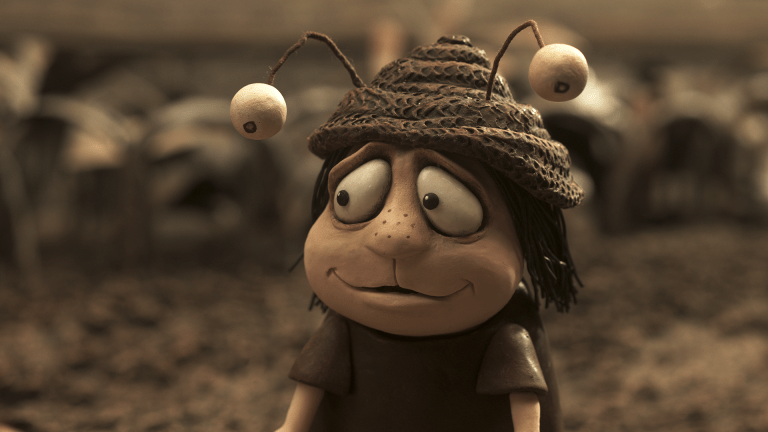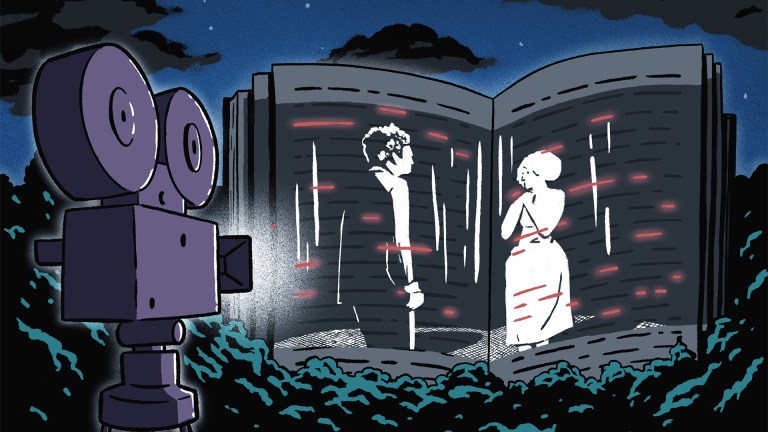Gilgun surveys the scene. We are sitting in the gutter in a car park on a cold, rainy summer’s day. But he is looking at his co-stars. He is looking at his gang. And his eyes, not for the last time during our interview, are filling with tears. “It changed everything for me. It changed what I wore, what music I listened to, my friends, my career,” he says, recalling the impact of winning his role in the film back in 2006 (pictured below).
“Without it, I would still be plastering and selling bits of weed here and there, working on shitty building sites, pissed off, knowing I could have maybe done something. But Shane found me, this young lad with shit hair, and gave it to me. I remember him saying, ‘you can have it’ like it was a bag of sweets. And in that moment, this was always going to be. I try to explain how close we are. It is not like a normal job, this is life-changing shit. Every series of This Is England changes who you are as a human being. There will never be anything else like this.”
Vicky McClure (below) approaches us in the gutter. “What does this bastard want?” grins Gilgun, beckoning his on-screen partner to join us. McClure spent the previous two series being “put through the mill”. The brutal scene from 86 in which Lol was attacked by her dad (Johnny Harris) lingers long in the memory. Gilgun still can’t watch it. “Our characters are all just a variation on who we are,” he says. “They are real people to me, so it is difficult to watch those people suffering. It has too much of an impact on me, it fucking hurts.” McClure was relieved to see Lol in a relatively happy place as the new series begins.
I was destined for jail. Life wasn’t looking that promising
“Oh my God, I have had so much more fun on this,” she laughs. “I have been out with the guys, partying, having a laugh. We have some funny, funny scenes.”
She talks about the show’s legacy, the freedom to improvise that Meadows allows the cast, the way she annoys her co-stars on BBC Two’s Line of Duty by constantly saying, “on This Is England we do this, Shane Meadows lets us do that”, and her fierce pride that half the cast are from her hometown, Nottingham.
Advertising helps fund Big Issue’s mission to end poverty
“We are always going to have this as our thing – we own it and protect it like nobody’s business,” she says. “If Shane came round with a contract, signing us all up for life but saying we couldn’t do another job? Okay, where do we sign? I know actors who would die to be in this show.” I whip out a picture from the original film. A wave of nostalgia, then a happy memory. “Thomas Turgoose looks stupidly tiny in that first film,” says McClure, smiling. “Do you know, I used to pay him a pound to fart? Honestly, he could do it on demand. It was his way of making money.”
If McClure is now an award-winning actor and Gilgun has followed an impressively controlled performance in Pride by working with Michael Caine, Bryan Cranston and Vin Diesel, the transformation of the youngest cast member’s life is perhaps the most dramatic. Turgoose has, he tells me in the relative warmth of the catering bus, just bought a house with his girlfriend in his hometown of Grimsby. He seems settled and happy.
“We are just decorating and shit. I’m loving it,” he says, adding that after “a three-year bender” he has rediscovered his love for acting. Between auditions, Turgoose has taken his football coaching badges and been helping local kids at Football in the Community in Grimsby, as well as working at his local pub. But this was not the future expected for him when he was originally cast, as an 11-year-old.
He told me that when ecstasy came on the scene it dissipated so much of the anger and violence between rival football supporters
“I was destined for jail. Life wasn’t looking that promising,” says the actor, now 21, who, according to legend, only turned up to the original audition when Meadows promised him a fiver. “I probably would have carried on getting in trouble with the police. This has given me something to hang on to.”
Like his colleagues, Turgoose won’t hear a bad word about Meadows. “There is nothing I couldn’t say to him,” he says. “When my mum passed away just after we made the film, it was 4am and the first person I rang was Shane. He fucking got straight in his car and drove to Grimsby with Stephen Graham.
“He was there, organised a minibus for everyone to come to the funeral. He is a lovely bloke. And this is a gang I will have forever.”
Advertising helps fund Big Issue’s mission to end poverty
Gilgun echoes his castmates when he says: “We have to be protective of Tommo. He is like this wayward son we all have to keep our eye on. He was so vulnerable as a kid. He went through some real shit at such an early age. To lose your mother – it is just fucking insane. To go through that and come out of the other end and be such a wonderful human being…”
Coming in the wake of Christopher Eccleston once again raising the prickly subject of the British acting industry’s recent domination by privately educated, upper-middle class actors, This Is England 90 stands like a beacon in the schedules.
Most of the cast came via Nottingham’s Television Workshop, which offers first-class training in acting and improvisation, yet is cheap or free depending on ability to pay. “None of us were given a great start in life,” says Andrew Shim, who plays Milky. “I certainly wasn’t. But my grandma sent me to the workshop and it has officially changed my life.”
Take away This Is England, take away the Television Workshop, and the talent pool in the UK acting industry becomes even more dangerously shallow. This Is England inspires a devotion rarely seen among television fans. Instead of the chin-stroking reverence with which some talk of Breaking Bad or The Wire, there’s a joyous obsession more regularly inspired by bands. Chanel Cresswell, who moves centre stage in This is England 90 as Kelly throws herself into the drugs scene, has a simple explanation: “This is a gang that you watch and want to be in.”
Joe Dempsie, another ex-workshopper last seen in Game of Thrones, points to the show’s immersion in music. “People old enough to remember those times love how faithfully it is recreated, enjoy the nostalgia,” he says. “And This is England stirs up those rebellious feelings in the younger generation, who might be disenchanted with the state of modern popular music.”
Advertising helps fund Big Issue’s mission to end poverty
Dempsie recalls conversations with Meadows about football casual culture. “He told me that when ecstasy came on the scene it dissipated so much of the anger and violence between rival football supporters. We mirror that in this series. All is forgiven in a sea of ecstasy and good vibes.”
In the new series, while Lol retains her mod style, the younger gang enjoy the second summer of love – perhaps the last hurrah for subcultural street style, as ravers and fans of Madchester united in baggy fashions. “The music scene changes dramatically. And we see the heroin scene, the pills and the acid. I remember this period well,” says Gilgun who, as Woody, is now sporting jogging pants and a bushy beard.
“There was this wave of us northerners feeling cool for the first time since The Beatles.”
Jack Thorne has co-written all three series with Meadows, who he calls “Britain’s greatest auteur. “Awesome, in the true sense of the word”.
He describes sitting in a Nottingham hotel, opposite Meadows, passing scenes across the table for inspection as the most “exciting and intimidating” experience of his career. “This is the story Shane always wanted to tell,” he says. “As well as everything else, this is a show about people getting older. In the second episode there is a barbecue, and it is fantastic seeing Woody and Lol become a bit less cool. Watching Joe Gilgun singing along to the Stone Roses like a less with-it uncle is very special.”
Again, life is imitating art. Four of the younger cast are now parents. Turgoose isn’t the only homeowner. “We are growing up,” says Shim. “We still go out every night and get pissed. But instead of rolling in at 5am, I might roll in at 2am now.”
Advertising helps fund Big Issue’s mission to end poverty
Meadows has said 1990 was the last time his life was interesting, meaning his quasi-autobiography is now at an end. But Gilgun has heard talk of This Is England 92. And all agree that seeing the characters in 1996, with Britpop, Euro 96 and Tony Blair on the verge of power would be fun. “Anything to stay together, man. I would do anything to stay with this gang,” says Gilgun.
And if this is the end? “If this is the last one,” says McClure, “then we have gone out with a fucking great big bang…”
